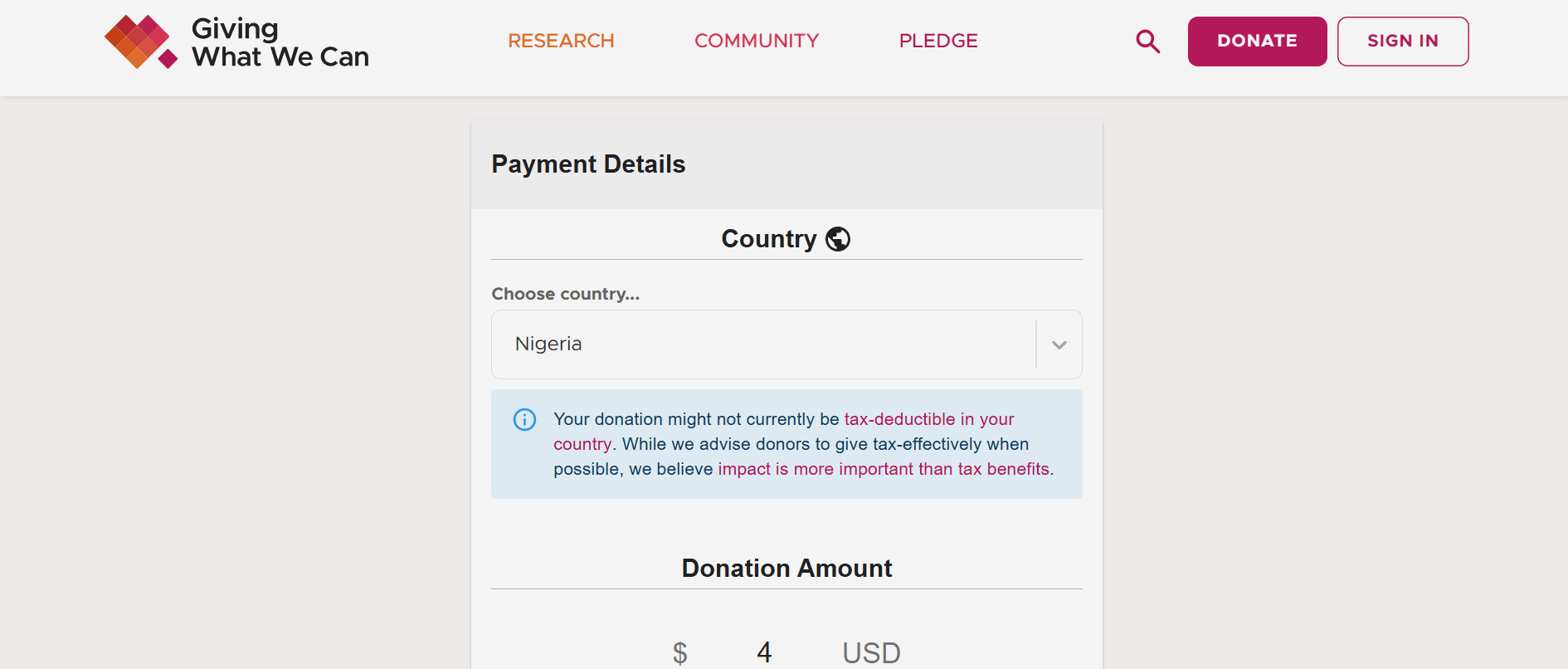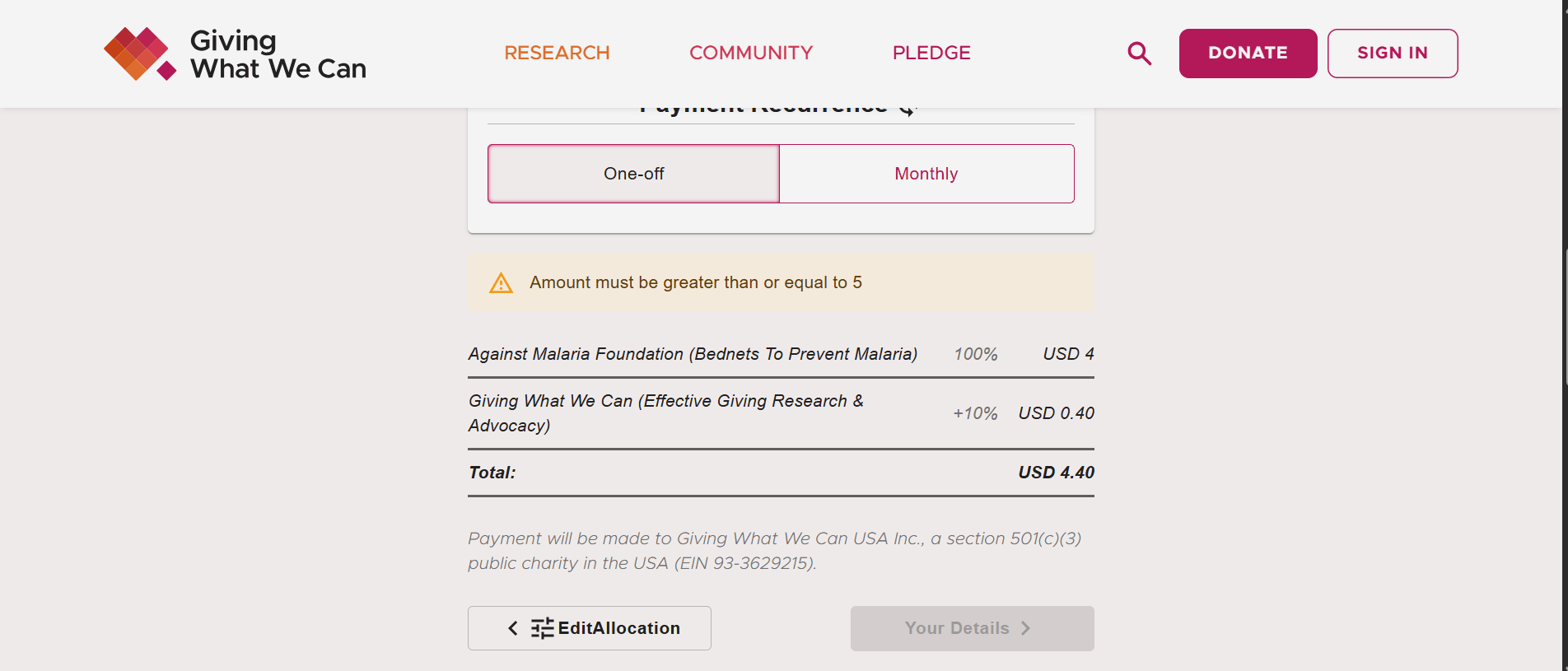I wanted to share a small but important challenge I've encountered as a student engaging with Effective Altruism from a lower-income country (Nigeria), and invite thoughts or suggestions from the community.
Recently, I tried to make a one-time donation to one of the EA-aligned charities listed on the Giving What We Can platform. However, I discovered that I could not donate an amount less than $5.


While this might seem like a minor limit for many, for someone like me — a student without a steady income or job, $5 is a significant amount.
To provide some context:
According to Numbeo, the average monthly income of a Nigerian worker is around $130–$150, and students often rely on even less — sometimes just $20–$50 per month for all expenses. For many students here, having $5 "lying around" isn't common at all; it could represent a week's worth of meals or transportation.
I personally want to make small, one-time donations whenever I can, rather than commit to a recurring pledge like the 10% Giving What We Can pledge, which isn't feasible for me right now. I also want to encourage members of my local EA group, who are in similar financial situations, to practice giving through small but meaningful donations.
In light of this, I would like to:
- Recommend that Giving What We Can (and similar platforms) consider allowing smaller minimum donation amounts to make giving more accessible to students and people in lower-income countries.
Suggest that more organizations be added to the platform, to give donors a wider range of causes they can support with their small contributions.
Uncertainties:
- Are there alternative platforms or methods that allow very small one-time donations to EA-aligned charities?
- Is there a reason behind the $5 minimum that I'm unaware of, and could it be adjusted to be more inclusive?
I strongly believe that cultivating a habit of giving, even with small amounts, helps build a long-term culture of altruism — and it would be amazing if students and individuals from around the world could participate more easily.
Thanks so much for reading. I'd love to hear your thoughts!

This is incredibly good and generous of you, but also I suspect that even on purely altruistic grounds it makes more sense to save the money for yourself and become slightly less risk averse as a result?
I don’t have a good model or rigorous justification for this, just an intuition
I disagree, giving habits are important to cultivate early, from a habit perspective even if from a dollar utility perspective you may be right.
Important to consider though!
Hypothesis: A big reason why organizations like Givewell exist is because developed currencies go further in developing countries -- but, it's hard for people in developed countries to know the best foreign orgs to give to. Givewell fills that gap by doing research and publicizing it.
Insofar as that hypothesis is true, we should encourage EAs in developing countries to look for giving opportunities in their personal network, if good opportunities seem to exist there.
Here's another way of making the same argument:
GiveDirectly does blanket cash transfers for entire communities.
A hypothetical version of GiveDirectly which targets only the very neediest individuals, or only the most inspired entrepreneurs who will do the most to stimulate the local economy and reduce poverty, could be even more cost-effective. (IIRC, Givewell thinks most of the impact from their top charities comes from indirect "flow-through effects".)
Sadly, targeting individual recipients isn't possible at the scale GiveDirectly operates at. But, targeting individual recipients does seem feasible for an individual African donor who has a strong local network.
Note also that GiveDirectly has lost many thousands of dollars to fraud? Presumably, fraud would be less of an issue for a savvy local donor.
I think this argument is weakest in areas where local knowledge doesn't help a lot for knowing what works.
Even though Givewell is based in the US, for a while they were ranking US educational charities. Having a strong local network in the US doesn't necessarily help a ton for knowing which educational interventions work.
However, I still think a "randomized" giving algorithm such as "if your friends say this school really helped their kid, donate to that school" might work quite well for a lot of small donors at scale.
Hi Habeeb,
I work at GWWC as the Head of Marketing :)
Thank you for your generosity and for sharing your perspective! We are actively interested in how we can help cultivate people giving effectively from all over the world, so this is really helpful feedback for us!
I've asked someone on the team who knows why we have the $5 minimum to follow up in the comments here, so stay tuned for their response. My guess is that with the processing fees associated, it might not make sense for us to support donations less than $5 - but this post will help us challenge those assumptions!
On why we don't have a bigger range of charities to donate to: We have a pretty strict process in terms of the charities we allow on our platform, which you can read more about in our inclusion criteria if you're interested. Basically, we want to make sure that donors have options that are sufficiently high-impact, and that the charities get sufficient value from being on our platform.
Some suggestions on donating smaller amounts:
I also liked the suggestions from others in the comments. I think there's lots of ways to donate and they don't all necessarily go through GWWC!
I appreciate your perspective on wanting to cultivate the habit of donating small amounts but also generally caution that especially for students, that you're making sure you have enough for your own expenses and emergencies first. Making sure that the habit is sustainable is an important factor for long term giving!
Thanks again for sharing this, Habeeb and I'll make sure someone else follows up about the $5 limit!
A great number of EAs in America/Europe could learn a lot from you.
I don't know why GWWC has this limit so can't comment on the request here but I think it's really cool that you're considering donating a significant portion of your monthly income to effective charities despite not earning much (especially compared to the global population). That's a selfless and inspiring act.
P.S. I hope you'll attend EAGxNigeria!
I can't speak to this specific case, but speaking generally, debit and/or credit card transactions can incur flat fee, making small donations not cost effective, especially if the card is in a foreign currency.
A sufficiently small donation can actually cost the organisation money, so it's very common to set a minimum donation amount. $5/£5 is likely safely north of that amount, but because fees can be variable, you do want to leave some padding in.
I’ve been thinking that there might be a reason why donations under $5 aren’t allowed, which could prevent some people from actually giving what they can. However, I’m not certain, and I believe this post might spark some helpful insights from the community.
Yeah, I am looking forward to attending EAGxNigeria.
You can donate to AMF via PayPal Giving Fund on this page and to Giving What We Can here. Currently, 100% of the donation amount goes to charity, as PayPal covers all payment processing fees on donations through this portal. I haven't tried making a small donation recently, but it looks like there is no minimum amount you can donate, and users regularly make $1 donations through the Give at Checkout feature. (Caveat: These links may only work in certain countries.)
I've included a screenshot below of the user interface for when you donate, though I didn't complete the checkout so I don't know if it'd work.
(Disclosure: I worked at PayPal from 2021 to 2024.)
(A $1 test donation worked for me a minute ago.)
Thanks for sharing!
I also tried donating to AMF via PayPal, and it worked!! :)
I think you can probably do better locally with an EA mindset than by donating through GWWC -- and this isn't a criticism of GWWC!
As a practical matter, a potential intervention needs to have enough room for additional funding and be long-term enough to justify the costs of evaluation and transaction costs, then the opportunity needs to actually come to the attention of GWWC or another organization.
I suspect you'd have access to some highly effective microscale and/or time sensitive opportunities that GWWC and people like me do not. You also are likely to have local knowledge to evaluate those opportunities that people like me lack.
Related to this - as a journalist covering global health and development, one thing I struggle to get is accurate information on the ground from developing countries about the effects of US policies and cuts. One thing that EAs in Nigeria are uniquely positioned to do is keep us informed - I'd really value someone going to three HIV clinics in their area in Nigeria, checking if they are open, and if they're open asking them about their funding/how many people go there/how they've been affected by the freezing, unfreezing and cancellation of USAID grants/ whether they have any stories patients are willing to share about the effects of cancellations. Non-results (everything is running smoothly and unaffected) are also valuable.
I'm currently based in Nigeria and would be happy to help by visiting local HIV clinics to check their status, and gather necessary information and any stories related to USAID grant changes. Please let me know if there are specific guidelines or questions you'd like me to follow.
That would be amazing! The specific things I am interested in:
For each clinic that was open/available in early January 2025, are they still open now? Do they have access to funding and medication? If they are going to run out, when are they going to run out? Were their operations affected by the funding freezes?
If they were affected, do they have specific patients, or family members of patients who died, who would be willing to talk to American journalists about how they were affected? How much money did they spend annually, and how many people did they provide medication to? Was anything communicated to them about the reasons for the cuts?
My email is kelsey.piper@vox.com; let me know if you have any questions!!!
Not involved, but awesome! I'm quite keen to see what you find
I can pass this request on to the EA Nigeria team
I strongly agree with this! Before I had a stable income, I'd set aside 1€ a month to a separate bank account for charity. Usually, I'd wait a year or more to donate the accumulated money somewhere. (For context, I'm from Northern Europe.)
Every.org tentatively appears to not have a minimum donation amount.
A number of organizations affiliated with our cause areas are on that platform, I believe.
I don't know about GWWC's minimum specifically, but in NZ $5 is the smallest donation that is eligible for a tax credit. Many charities here use it as a minimum for that reason. Maybe there's something similar in other countries?
It may well be worth lowering the limit even if that's the case, but it's a potential explanation.